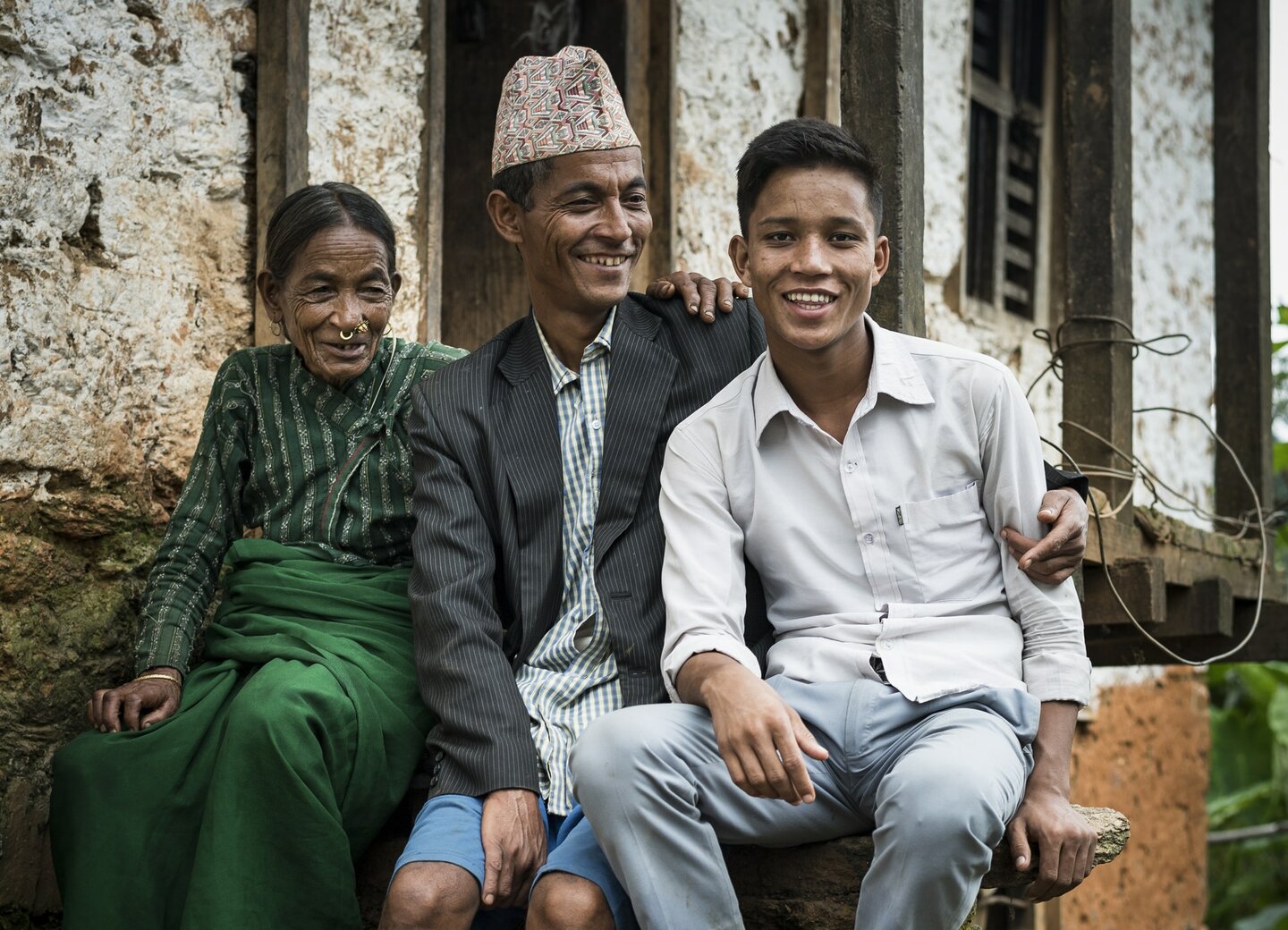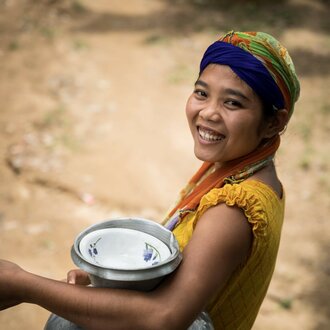Real change comes about when people incorporate the stimuli of development aid into their lives. The Shahis’ story illustrates how a family can take control of their own destiny. Grandmother Manpura Shahi eked out a future for her family on her smallholding. Her son Chakra Shahi was able to secure his family’s livelihood thanks to a Helvetas animal health course. Grandson Govind Shahi is studying to be a veterinary practitioner, with the family paying all his fees themselves.

The grandmother: Manpura Shahi, 75
“At night it was night, and in the daytime it was night too,” is how Manpura Shahi sums up her feelings when her husband died and she was left alone with their four-year-old son Chakra. She was living in a tumbledown hut, her husband’s relatives turned her away, and she had no one to help her with her smallholding.
Manpura Shahi, farmer
Manpura Shahi’s life as a woman on the fringes of society changed seventeen years ago when a Helvetas partner organisation organised a course on diversifying vegetable production in kitchen gardens. Manpura was fifty-nine at the time, making her an old woman by Nepalese standards, but she wanted to attend the course anyway. “My mother couldn’t read or write, but she knew how important education is,” says her son Chakra.
“I was the first to sign up for the course. The very first!” says Manpura, proud that she was brave enough to change her spots. The course’s immediate effects were limited, and yet that course was the turning point for her and her entire family. Manpura recalls, “In the course we spoke about how we were to behave towards each other. The course coordinator said we were all equal.”
The son: Chakra Shahi, 43
"She was happy. The vegetable-growing course had given her a new task, and she had new hope." Chakra Shahi is aware that his mother’s courageous decision changed his own life too. He also enrolled for the course. He wrote the minutes, ran the small savings fund and gained the participants’ trust. In 1999 they sent him on a Helvetas-funded animal health course.
Chakra Shahi, shopkeeper and seller of veterinary medicine
After forty-five days of training Chakra returned to Koldanda with a certificate. He had received an interest-free Rs. 2,500 loan from the course organisers (equivalent to CHF 56 at the time) to buy himself a basic stock of veterinary medicines and vegetable seeds.
Koldanda is a hamlet of thirty-two families in Birpath municipality in the highlands of Nepal’s Far West Province. It has no minerals and attracts no tourists, but the soil is fertile and farming families have begun to produce crops for which there is a market. One major factor in obtaining increased yields is the provision of technical training for farmers and for professions such as mechanics and metal workers involved with agriculture.
Chakra was one of the first to enrol for further training, and he now has his own shop in Koldanda. Alongside vegetable seeds, worming tablets and tick treatments he also sells salt, sweets, school notebooks, razorblades, matches and cigarettes. His veterinary medicine store is the only one within a six-mile radius. Chakra has become a respected and prosperous man, who also sits on the school’s board of governors and on the village’s agriculture and water committees to promote progress in his hometown.
The grandson: Govind Shahi, 17
“But the school costs over 100,000 rupees,” said Govind when the family discussed his further education. 900 Swiss francs – a lot of money in a country where the lowest income from farming is a mere two Swiss francs per day. His father reassured him: “We can pay for it. Go and enrol.” The family gathered together all their savings so that Govind could attend school; they regard it as an investment in the future.
Govind Shahi, veterinary practitioner
When Govind left home for Gurans middle school in Bardiya to attend a course focusing on veterinary medicine and agricultural production, his grandmother gave him the very same advice she had given to his father all those year earlier: Study, be polite and work hard. “I admire her,” says Govind. “She made sure my father went to school, and that changed our family’s life.”
Govind’s training is more comprehensive than his father’s was. He now knows how to plan an animal vaccination campaign, where to get the vaccines and how to store them, how much fresh and how much dry feed to give animals, and how to do simple bookkeeping and make out invoices. He has also learnt which crops will grow in the highlands alongside the traditional grains and pulses: potatoes, onions, walnuts, yellow turmeric roots and tomatoes. He didn’t attend the course only for himself but for the whole village, and he has never seriously considered moving away from here.
During a visit home Govind shows his father what he has learnt about the symptoms of cattle diseases. He explains how to diagnose the consistency of a cowpat and demonstrates how to palpate a cow’s neck or sides. His father is absorbed by his explanations.
That may be because he is learning many new things, but it might simply be pride at his son’s newfound knowledge. The Shahi family do not flaunt their relative wealth. The house and the shop show none of the signs of economic success one sees in other families: no television set, no motorbike, not even a bicycle. The Shahi family do not flaunt their relative wealth. The house and the shop show none of the signs of economic success one sees in other families: no television set, no motorbike, not even a bicycle. "The usual status symbols aren’t part of their plans. Families like the Shahis invest in education." Kirti Raj Pant, Helvetas regional project manager.
Nothing can stop a grandmother worrying about her grandchildren
Govind has returned to his family after spending almost a year away at agricultural college. His grandmother runs her hand over his cheeks and says what every grandmother says when her grandchildren come back from foreign parts: “You’ve lost weight.” Later, at dinner, she serves him an extra-large portion of the sweet rice pudding that she has cooked to celebrate his homecoming. Govind is reluctant, but then, like grandchildren all over the world, he cleans his plate.


















